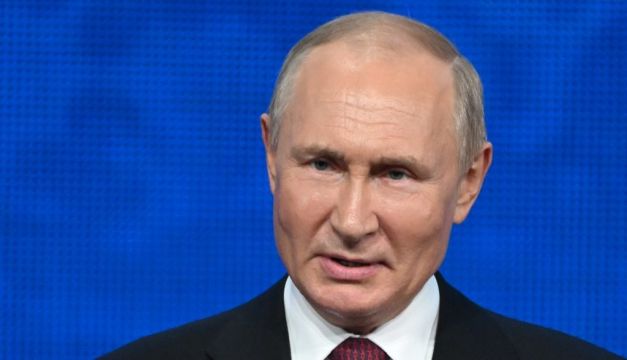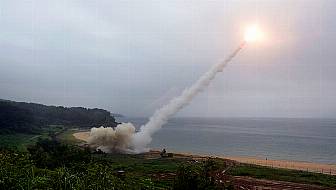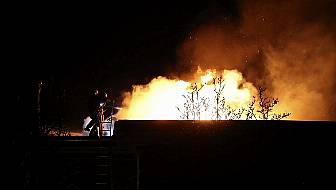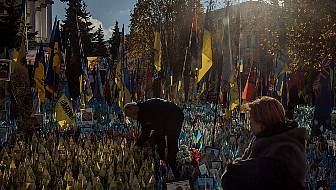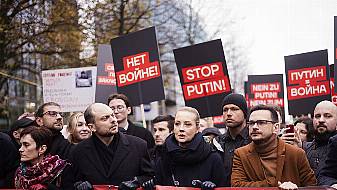President Vladimir Putin's thinly veiled threat to use nuclear weapons after Russian setbacks in Ukraine was "dangerous and reckless rhetoric," Nato's secretary general said on Wednesday, adding that the only way to end the war was to prove Moscow will not win on the battlefield.
Jens Stoltenberg also told Reuters in an interview that Putin's announcement of Russia's first military mobilisation since World War Two would escalate the conflict and cost more lives. But, the Nato chief added, it also represented evidence that Putin had made a "big mistake" with Russia's decision to invade its neighbour on February 24th.
Mr Stoltenberg, speaking to Reuters Editor-in-Chief Alessandra Galloni in New York on the margins of the annual United Nations General Assembly meetings, said the 30-nation Western defence alliance will stay calm and "not engage in that same kind of reckless and dangerous nuclear rhetoric as President Putin".
"The only way to end this war is to prove that President Putin will not win on the battlefield. When he realizes that, he has to sit down and negotiate a reasonable agreement with Ukraine," Mr Stoltenberg said.
In an address to Russians earlier, Putin announced he would call up 300,000 reservists to fight in Ukraine and backed a plan to annex parts of the country, hinting to the West he was prepared to use nuclear weapons to defend Russia.
"If the territorial integrity of our country is threatened, we will use all available means to protect our people - this is not a bluff," Putin said.
Russia possesses "lots of weapons to reply," Putin added.
Russian casualties
Putin's speech followed mounting casualties and battlefield setbacks for Russian forces, who have been driven from areas they had captured in northeast Ukraine in a Ukrainian counter-offensive this month and are bogged down in the south.
"The speech of President Putin demonstrates that the war is not going according to President Putin's plans," Mr Stoltenberg said.
"He made a big mistake, strategic mistake," Mr Stoltenberg said of Putin, while making a grim prediction.
"More troops will escalate the conflict. That will mean more suffering, more loss of lives - Ukrainian lives, but also Russian lives," Mr Stoltenberg said.
Putin said, offering no evidence, that officials in Nato member states had threatened to use nuclear weapons against Russia, and that Russia "also has various means of destruction."
Nato has not seen any change in Russia's nuclear posture and readiness, Mr Stoltenberg said, but added that the key was to prevent such an escalation.
"We will make sure that there is no misunderstanding in Moscow about the seriousness of using nuclear weapons. ... And that's the reason why we have been so clear in our communications with Russia about the unprecedented consequences, about the fact that the nuclear war cannot be won by Russia."
'A hard winter'
Mr Stoltenberg said that although Russian troops were ill-equipped and lacked proper command and control, it was hard see the conflict ending in the short term as long as Russia refuses to accept that Ukraine is a sovereign and independent nation.
Mr Stoltenberg expressed confidence that throughout, the Western alliance will stay united.
"We are prepared for a hard winter. The winter is coming, it's going to be hard for all of us. But the answer is not to step down and to stop supporting Ukraine. The answer, if anything, is to step up and further support Ukraine," Mr Stoltenberg added.
As Nato was prepared for a "long haul" in dealing with Putin, it was now in close dialogue with the defence industry to build back its stocks of weapons and ammunition, Mr Stoltenberg said.
"We have reduced a lot of stocks. We need stocks to be prepared. That's the reason why we are now deeply engaging with the industry," Mr Stoltenberg said, with the aim of ramping up production.
Mr Stoltenberg once again expressed confidence that the Nato membership of Sweden and Finland, which applied to join the alliance in the aftermath of Russia's invasion of Ukraine, would be ratified, even as Turkey continued to express concerns over the move.
Nato does not see China as an adversary, Mr Stoltenberg said, but expressed growing concern over Beijing's increasingly closer cooperation with Moscow on military exercises and in the diplomatic domain.
"China is part of the security challenges we need to face today," Mr Stoltenberg said.
Mr Stoltenberg, who previously served as Norway's prime minister, has held the post of Nato secretary-general since 2014. Nato allies in March extended his mandate in the post to September 2023.
